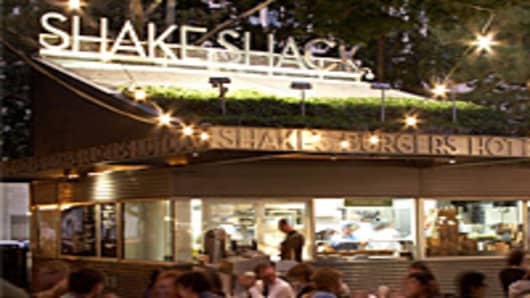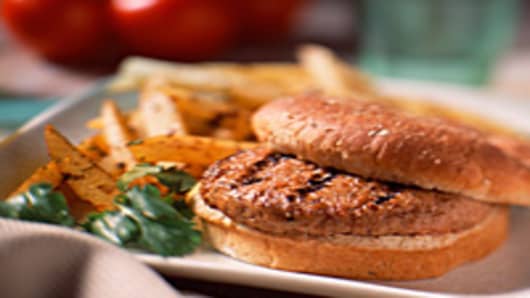At least where revenue is concerned, more is always a good thing. In a lot of other ways, especially in a small business with a cool culture, more is usually a bad thing.
Randy: We want to be the "anti-chain chain." We never talk in terms of "units" or "templates" or "how fast can we go?"
We talk about, "What great community can we be part of? How can our other restaurants get better and busier in the process of opening another Shake Shack? When will we have developed enough great leaders and team members who are ready to lead another Shack?"
Our goal is to grow a successful global business and in the process help more ranchers raise animals without hormones and antibiotics; grow more team members into leaders making good salaries and getting benefits and supporting their families; minimize our impact on the environment by using more reclaimed materials like the old bowling alleys we make into our tables; build safe and fun places for people from every walk of life to come together to eat and celebrate and enjoy each other's company — and to do it in the most responsible way.
That's not selling out. That's smart growth for the right reasons.
It's these ideas that inspire us and lead us to believe growth can be a great thing when done right. That's our goal.
Jeff: So how do you deal with what's normally the bane of the restaurant owner's existence, the employee-turnover factor?
Forget that it's an industrywide issue; your Shacks in particular seem like relatively high-stress places for entry-level employees. There's always a line; sometimes customers wait an hour or more just to order. (Readers: You can view the line in real time on theMadison Square webcam.)
Clearly your customers are happy to wait... but that line has to make your employees feel like they're constantly under the gun. At least it would make me feel that way...
Randy: The nature of the beast is that high turnover still exists. We believe we are thoughtful and caring employers, but we're not immune to the challenge.
For us, it all begins with our concept of enlightened hospitality. Our team comes first. If they feel taken care of, they will do great work caring for our guests, our community, our purveyors, and our investors.
Once that's established, we do a few things to add to their opportunity. We pay up to 1% of total revenue — top line, not bottom line — as a monthly bonus. We pay employees extra bonuses for things like coming to work 30 days straight without any issues and/or for recommending their friends. We also offer medical/dental/flex spending benefits and a 401(k) to any employees working over 25 hours a week.
But most important, we give you the opportunity to grow. "Leaders training future leaders" is how we put it. Nothing matters more than our leaders giving our team a pat on the back. For a lot of our team, this is their first job... or at least it's the first place they've come to work where they've been respected and thanked.
We generally find that when that happens they want to stay, they want to grow... many have gone from hourly employees to managers and even to general managers. This is what it's all about for us.
And really, doesn't a burger just taste better when a kind and happy person served it to you?
Jeff: I've had one of your burgers. The Soup Nazi could serve them, and they would still taste good. But I get your point.
When I was there, what also came across pretty clearly at the Madison Square Park location was that it's "of the neighborhood," so to speak. (I mean that in a really good way.) How do you pull that off when you go to other New York neighborhoods — each with its own distinct flavor (sorry, couldn't resist) — and then to other cities?
Randy: That's the entire strategy we have of being the anti-chain. Take, for instance, what we did in Philly: When we started construction, instead of doing what everyone else does — put up a big, ugly wall that's an eyesore in the neighborhood during construction — we teamed up with a local Philly designer to turn the plywood siding into a living green wall. It was a little a corner "park," if you will, and our neighbors responded enthusiastically! They loved seeing the beautiful plants and greenery as they passed by during the first days of spring. When the wall came down, we donated the planters and plants to the Rittenhouse Flower Market for Children's Charities.
Then, for our menu, we teamed up with local favorites, La Colombe Coffee, Termini Brothers Bakery, and Federal Donuts — some of the best artisanal producers in the city — and added their best products into our "Concretes" on our Frozen Custard menu. Each one is named for Philly, and each is produced near our Shack. We even sell Yuengling beer!
When we talk about design, menu, team, and everything else that goes into building our Shacks, we always talk about doing it "of its place." That's part of everything we do to make sure we follow our "The bigger we get, the smaller we need to act" philosophy.
Jeff: You're undeniably successful, but it can't have all gone perfectly. Tell me about a major misstep, a miscalculation, or just something you wish you'd done differently.
Randy: We make big mistakes every day. Champions are people who believe the road to success is paved with mistakes well handled.
One big one: Early in our growth, we chose a location, designed, and almost built a Shack in the Nolita area of New York. It was a great site and would have been an amazing business. But we ultimately let it go after spending a lot of time listening to the concerns of immediate neighbors, who felt our impact on the neighborhood would have been too great.
So, we gave it up and lost a fair amount of money, but we also learned a huge lesson that has continued to guide our decisions today — building our Shacks to fit the place they will be.
That was a painful one, but I think it made us a lot stronger.



